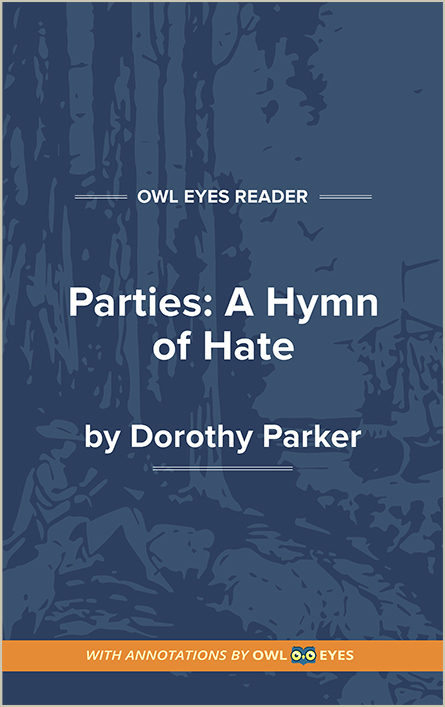Analysis Pages
Dorothy Parker Biography
Dorothy Rothschild was born to J. Henry Rothschild, a rich, well-known Jewish clothing merchant, and Eliza A. Rothschild, a schoolteacher of Scottish descent who died a few years after Dorothy’s birth. Dorothy’s unhappy, lonely childhood was further saddened by the death of her stepmother a couple of years later and eventually the deaths of her brother in 1912 and her father in 1913. She was expelled from Blessed Sacrament Convent School after insisting that the Immaculate Conception was “spontaneous combustion,” and was then sent to Miss Dana’s finishing school in New Jersey. There she studied and imitated Latin writers such as Horace and Martial, whose epigrams influenced her early poems and witticisms.
After the death of her father, Dorothy lived in a Manhattan boarding house, supporting herself by working in a bookstore and playing piano in a dance school. She published her first poem in Vanity Fair magazine and soon after wrote captions (“Brevity is the soul of lingerie”) in Vogue magazine for fashion ads. She was then hired as dramatic critic for Vanity Fair. There she met lifelong friends Robert Benchley and Robert Sherwood. In 1917 she married stockbroker Edwin Parker. Edwin, already a heavy drinker, came back from his military service in World War I and became an alcoholic. Dorothy, too, became an alcoholic, from both his influence and that of the writers associated with the Algonquin Hotel. She separated from her husband a few years later and eventually divorced in 1928, retaining thereafter the name of “Mrs. Parker.”
Together with Benchley and Sherwood, Parker was one of the founding members of the entity called the Algonquin Round Table at the hotel of the same name, where famous literary figures such as Franklin Pierce Adams, Alexander Woolcott, George S. Kaufman, James Thurber, Harold Ross, and others ate lunch and engaged in witty repartee which sometimes found its way into newspaper and magazine columns. Parker was one of the very few major women writers of this inner circle (sometimes called the “vicious circle” for its caustic sarcasm) and the only woman of the founding group who regularly attended. In later years, Parker dismissed the years of the 1920’s that she spent at the Algonquin Round Table, saying that she was just “a little Jewish girl trying to be cute.”
Nonetheless, at these gatherings Parker honed her razor-sharp sarcasm and became well known for her scathing wisecracks. For example, told that the taciturn President Calvin Coolidge was dead, she quipped, “How can you tell?” When asked to use the word “horticulture” in a sentence, she replied, “You can lead a horticulture but you can’t make her think.” Her short couplet “Men seldom make passes/ At girls who wear glasses” became a catchphrase of the time. In one of Parker’s reviews of actress Katharine Hepburn in a lackluster play, she said, “Miss Hepburn ran the gamut of emotions—from A to B.” In fact, one such disparaging comment about an actress who happened to be married to an influential financial backer caused Parker to be fired from her job as a Vanity Fair drama critic for being too severe. In sympathy with her, both Sherwood and Benchley quit their positions at the magazine in protest.
After a brief stint as an independent writer sharing with Benchley a cubbyhole office which was so small that “one cubic foot less would have constituted adultery,” she found another reviewing job at Ainslee’s Life magazine. She also contributed freelance verse and criticism to Life, The Saturday Evening Post, and the Ladies’ Home Journal and published her first short story in The Smart Set in 1922. Outwardly, Parker’s prospects looked bright in this Jazz Age of parties, speakeasies, and sexually liberated flappers. Inwardly, her ruined marriage and separation, her drinking, and the procrastinating, continuous party atmosphere was taking a toll.
After having a devastating romantic affair with playwright and...
(The entire page is 980 words.)
Owl Eyes subscribers get unlimited access to our expert annotations, analyses, and study guides on your favorite texts. Master the classics for less than $5/month!

